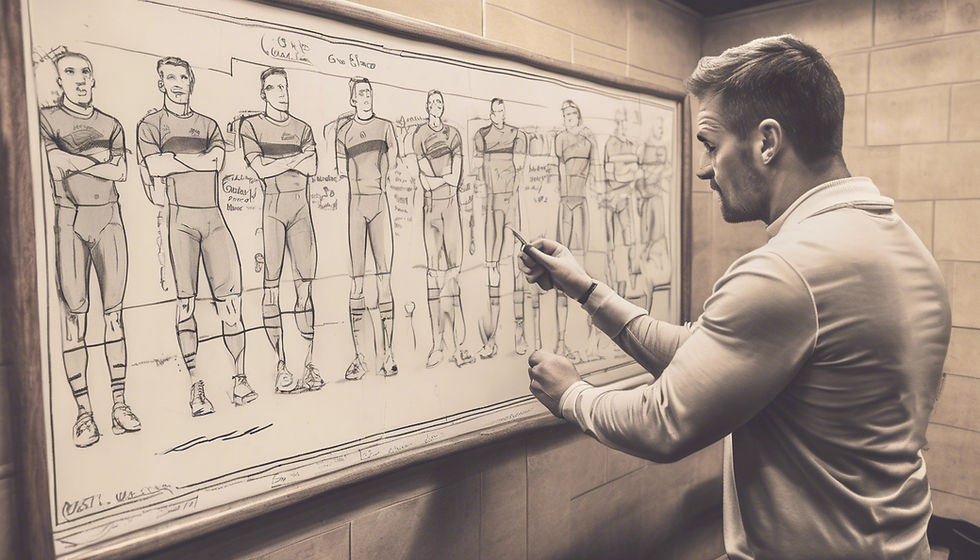Unleashing the Power of the Coach, Model, and Care Framework: A New Approach to Elevated Leadership
- Mark Stokes

- Mar 19, 2025
- 4 min read
In today's fast-paced world, effective leadership is crucial. The ability to inspire and guide teams can make or break an organization's success. Exceptional leaders can be cultivated through innovative frameworks that enhance leadership practices. One such framework is the "Coach, Model, and Care" approach, which focuses on collaboration, accountability, and holistic development. This post explores how this framework drives better leadership by creating a supportive and learning-oriented culture.
Understanding the Foundations of the Coach, Model, and Care Framework
The Coach, Model, and Care framework is built on three key pillars: coaching, modeling behavior, and caring for team members.
Coaching encourages leaders to provide mentorship and support. For instance, a study by the International Coaching Federation found that organizations with strong coaching cultures can see a 70% improvement in employee performance.
Modeling behavior means leaders demonstrate the values and actions they expect from their teams. A leader who consistently arrives on time, communicates openly, and tackles challenges head-on sets a powerful example.
Caring ensures that leaders foster the well-being of their teams. A caring approach cultivates trust, allowing team members to feel valued and motivated. Companies with supportive leadership see a 13% higher employee engagement rate compared to those without.
By integrating these three elements, leaders create an environment where everyone feels encouraged to contribute their best work.
The Role of Coaching in Leadership Development
Coaching is an effective method to enhance leadership skills and team effectiveness. It goes beyond simply managing tasks and focuses on empowering team members for personal and professional growth.
For example, a leader who meets monthly with team members to discuss career goals can help build strong relationships while pushing for individual development. This ongoing dialogue fosters open communication, where team members feel safe to voice their ideas and concerns.
Leaders who adopt a coaching mindset often create strong connections, leading to a culture built on trust. In fact, teams led by coaching-focused leaders report a 37% increase in job satisfaction. Coaching also promotes accountability, instilling a sense of ownership in team members. This can lead to improved performance, as employees feel more responsible for their results.
Exemplifying Through Modeling Behavior
Modeling behavior is essential for building an effective leadership culture. Leaders should demonstrate the values, ethics, and behaviors they expect from their teams.
For instance, if a leader prioritizes ethical decision-making, team members are likely to mimic this value. Research indicates that 70% of employees cite their manager's behavior as a key factor influencing their own professionalism.
Additionally, when leaders share their challenges and how they overcome them, they become more relatable. This openness cultivates an authentic environment and encourages team members to face their own challenges with resilience.
The Importance of Caring in Leadership
While coaching and modeling behaviors are vital, caring may be the most impactful aspect of the Coach, Model, and Care framework. Leaders who genuinely care prioritize their team members' well-being, both personally and professionally.
Active listening is a key component of caring leadership. When leaders value team members' perspectives, they foster a supportive culture. A study found that organizations that prioritize mental well-being experience a 33% reduction in employee absenteeism.
This approach creates happier employees, leading to better retention rates. When workers feel valued, they are more likely to stay with the company and contribute their best efforts.
Building a Culture of Continuous Learning
One of the significant benefits of the Coach, Model, and Care framework is its ability to establish a culture of continuous learning. Leaders who prioritize personal growth encourage their teams to pursue new skills and knowledge.
For example, Amazon invests heavily in employee training programs, leading to a reported 30% higher employee satisfaction compared to companies that do not prioritize learning. When leaders model lifelong learning by seeking out new knowledge, they inspire their teams to embark on similar journeys.
Implementing the Framework in Your Organization
To fully realize the potential of the Coach, Model, and Care framework, organizations can embrace several best practices:
Training Programs: Develop training initiatives that equip leaders with effective coaching skills. This training helps leaders learn how to mentor their teams successfully.
Feedback Mechanisms: Create channels for regular feedback. Encouraging open communication allows employees to voice their concerns and ideas, building trust and collaboration.
By incorporating these practices into their leadership framework, organizations can cultivate engaging and supportive environments that drive collective success.

Embracing Elevated Leadership
Incorporating the Coach, Model, and Care framework into leadership practices can usher in a new era of effective leadership. By embracing coaching, modeling desired behaviors, and showing genuine care for team members, leaders can create a culture of engagement, growth, and well-being.
This innovative framework benefits individual team members and boosts overall organizational performance. As businesses adapt in an ever-changing landscape, prioritizing these elements will be key to cultivating the leaders of tomorrow. Organizations that invest in their people can unleash their full potential and achieve remarkable success.
Ultimately, the journey toward elevated leadership begins by understanding and embracing the power of coaching, modeling, and caring for others. This commitment can pave the way for a brighter future for everyone involved.




Comments